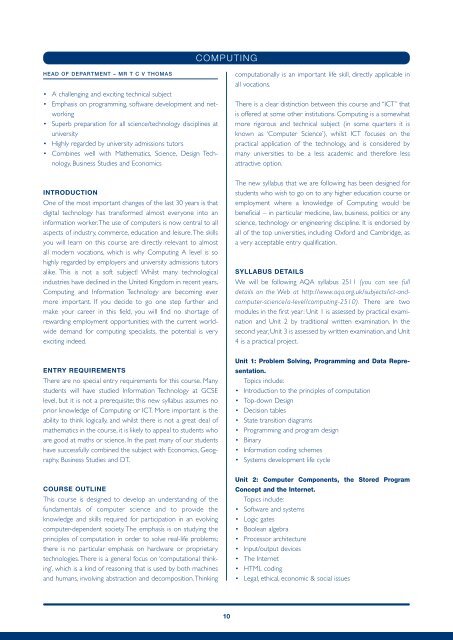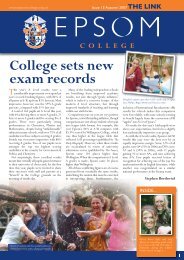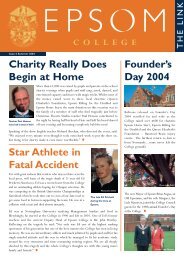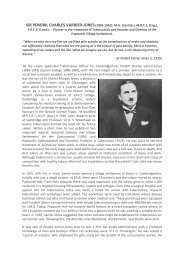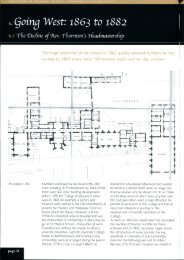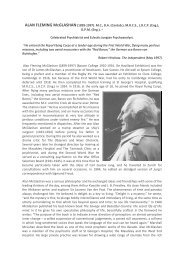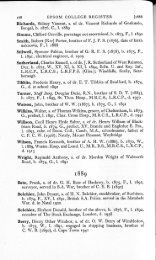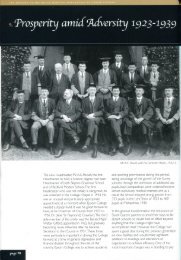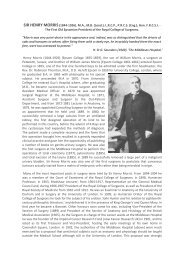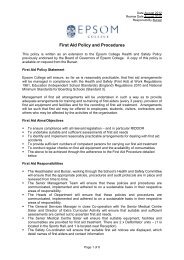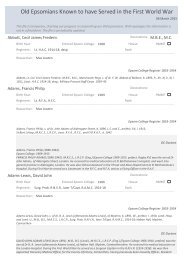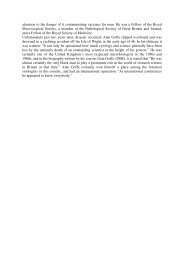Sixth Form Information Booklet 2014 - Epsom College
Sixth Form Information Booklet 2014 - Epsom College
Sixth Form Information Booklet 2014 - Epsom College
- No tags were found...
You also want an ePaper? Increase the reach of your titles
YUMPU automatically turns print PDFs into web optimized ePapers that Google loves.
COMPUTINGHEAD OF DEPARTMENT – MR T C V THOMAS• A challenging and exciting technical subject• Emphasis on programming, software development and networking• Superb preparation for all science/technology disciplines atuniversity• Highly regarded by university admissions tutors• Combines well with Mathematics, Science, Design Technology,Business Studies and Economicscomputationally is an important life skill, directly applicable inall vocations.There is a clear distinction between this course and “ICT” thatis offered at some other institutions. Computing is a somewhatmore rigorous and technical subject (in some quarters it isknown as ‘Computer Science’), whilst ICT focuses on thepractical application of the technology, and is considered bymany universities to be a less academic and therefore lessattractive option.INTRODUCTIONOne of the most important changes of the last 30 years is thatdigital technology has transformed almost everyone into aninformation worker.The use of computers is now central to allaspects of industry, commerce, education and leisure.The skillsyou will learn on this course are directly relevant to almostall modern vocations, which is why Computing A level is sohighly regarded by employers and university admissions tutorsalike. This is not a soft subject! Whilst many technologicalindustries have declined in the United Kingdom in recent years,Computing and <strong>Information</strong> Technology are becoming evermore important. If you decide to go one step further andmake your career in this field, you will find no shortage ofrewarding employment opportunities; with the current worldwidedemand for computing specialists, the potential is veryexciting indeed.The new syllabus that we are following has been designed forstudents who wish to go on to any higher education course oremployment where a knowledge of Computing would bebeneficial – in particular medicine, law, business, politics or anyscience, technology or engineering discipline. It is endorsed byall of the top universities, including Oxford and Cambridge, asa very acceptable entry qualification.SYLLABUS DETAILSWe will be following AQA syllabus 2511 (you can see fulldetails on the Web at http://www.aqa.org.uk/subjects/ict-andcomputer-science/a-level/computing-2510).There are twomodules in the first year: Unit 1 is assessed by practical examinationand Unit 2 by traditional written examination. In thesecond year, Unit 3 is assessed by written examination, and Unit4 is a practical project.ENTRY REQUIREMENTSThere are no special entry requirements for this course. Manystudents will have studied <strong>Information</strong> Technology at GCSElevel, but it is not a prerequisite; this new syllabus assumes noprior knowledge of Computing or ICT. More important is theability to think logically, and whilst there is not a great deal ofmathematics in the course, it is likely to appeal to students whoare good at maths or science. In the past many of our studentshave successfully combined the subject with Economics, Geography,Business Studies and DT.Unit 1: Problem Solving, Programming and Data Representation.Topics include:• Introduction to the principles of computation• Top-down Design• Decision tables• State transition diagrams• Programming and program design• Binary• <strong>Information</strong> coding schemes• Systems development life cycleCOURSE OUTLINEThis course is designed to develop an understanding of thefundamentals of computer science and to provide theknowledge and skills required for participation in an evolvingcomputer-dependent society. The emphasis is on studying theprinciples of computation in order to solve real-life problems;there is no particular emphasis on hardware or proprietarytechnologies.There is a general focus on ‘computational thinking’,which is a kind of reasoning that is used by both machinesand humans, involving abstraction and decomposition.ThinkingUnit 2: Computer Components, the Stored ProgramConcept and the Internet.Topics include:• Software and systems• Logic gates• Boolean algebra• Processor architecture• Input/output devices• The Internet• HTML coding• Legal, ethical, economic & social issues10


